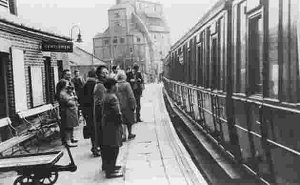Dunstable
Dunstable North Station
Places > Dunstable > Railways
Memories of Dunstable North Station 1942 - 1965 by J.F Williams
First published in the Dunstable & District Local History Society Newsletter No. 13, March 2000.

As a boy I was not particularly interested in railways and had no real idea of what I should do on leaving school. However, Mr Underwood, the Headmaster at Northfields School, obviously had other plans for me. When the then Station Master called on him wanting someone to train as booking clerk I was approached. After passing the necessary educational and medical examinations at Euston, in February 1942, I started my career with the London, Midland & Scottish Railway Company as it was then called. Their employees were always known as railway servants and employment usually ran in families.
The duties, I soon found out, were numerous and it was six months before I was allowed to be left in charge on my own, quite a daunting task for a 14 year old, although I had an out-and-out railway man porter with me, Arthur Gibbs, who had been all his working life on the railway. This was during the war and the blackout and I well remember trying to collect tickets, part of my duties, with an oil lamp in one hand, not the easiest of tasks. At that time there were 3 horses stabled in the goods yard there, used for deliveries around the town, Fred Beckett (Joe) was one of the draymen, and Harry Newman, who I believe is still alive, and Percy Leach who drove a Dennis lorry and did the out of town deliveries to Whipsnade, Studham, Hockliffe etc. All kinds of traffic were carried by passenger train. I had nothing to do with the goods side of the station, the office of which was in charge of Chief Clerk Fred Pollard, and the yard foreman was Horace Freestone, later followed by Sid Williams, no relation!
Various livestock included day old chicks from farms around the area, rabbits and mice going and coming to shows and exhibitions, and pigeons for release to return to their lofts, as far away as London perhaps. Sometimes more exotic animals were sent off from Whipsnade Zoo, usually brought in by Head Keeper Fates. Flowers arrived from Covent Garden for Mr Beavington at the Rower Shop and Phillip Buckle was often awaiting arrival of dress suits wanted for an evening do. A fish van came daily from Grimsby and Hull with fish for the local fishmongers. David Sewell collected his in his three-wheeled vehicle, the rest had theirs delivered, Pratts in Union Street and Stubbs in Church Street, among others. During the Season herrings would arrive in open topped boxes from Lowestoft and Yarmouth. One day one of these fell onto the railway line, someone had very gritty herrings that day. The station was always lighted by gas, had no electricity at all, and when there were cuts after the war during fuel shortages the station was a blaze of light in an otherwise blacked out town. On Saturday mornings at this time there would be quite a queue of prams and barrows waiting to be filled in the nearby coal yard. A special train was run for several seasons in connection with Vauxhall children's visit to Wembley to see either a pantomime on ice or something similar and tills would be during January. I well remember one occasion when a heavy snowstorm came on before the return train was due. Anxious parents filled the waiting room and a fire was lit outside in an oil drum to help keep them warm. The train finally arrived some hour or so late, two engines storming up Sewell bank to ensure it didn't come to a stand. We managed to get all the children for Dunstable North off safely, none fell off the platform in the darkness and snow, before the train roared off to Dunstable Town and Luton. I well remember the incident referred to in Steven Summerson's talk of the sad occasion in which the train had a blowback resulting in the death of the fireman who I knew well. How no children were killed on Brewers Hill level crossing I'll never know. This level crossing, in earlier years, was only used to get to Brewers Hill Farm, so was not used very much; but when the Beecroft Estate was developed, it became quite busy and had to be closed to road traffic when the yard or gas works was shunted. As this sometimes happened when A C Delco were coming out at dinnertime, tempers were easily aroused between them and the signalman.
The original signal box stood near the gas works, adjacent to their coal and coke storage pit and into which it gradually sank, resulting in a new signal box being built on the other side of the line. Although on a hot summer day Dunstable North Station appeared from High Street North to be sleeping in the sunshine, in fact it was quite a busy place and I have some happy memories of the time I was there and of the people I worked with, particularly of Jack Sear of Eaton Bray and Frank Powis of Tebworth, among many. I worked at Dunstable North station in the booking Office, apart from Army Service, from 1942 until its closure in 1965.
Page last updated: 27th January 2014
